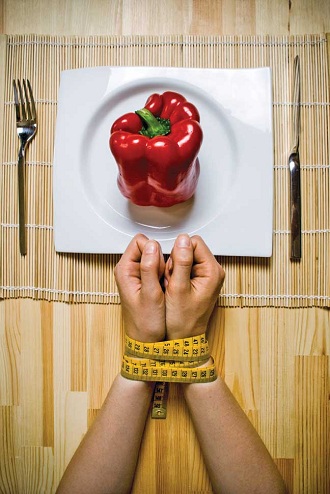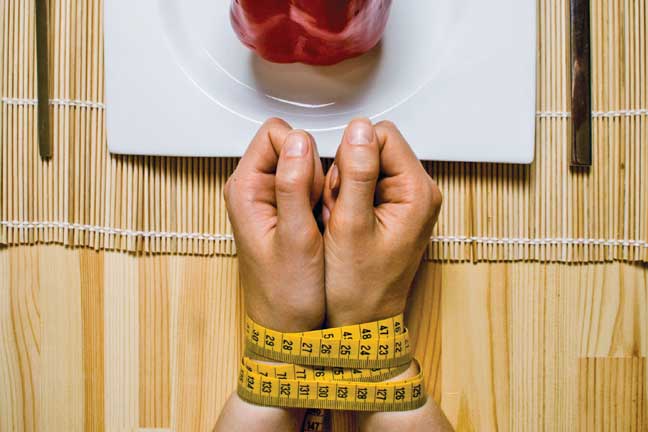 (Photo: © iStockphoto.com/szelmek)
(Photo: © iStockphoto.com/szelmek)
At the height of her struggle with anorexia, Trish was working out six hours a day, while using gum and tea to suppress her appetite. This dangerous combination brought her weight down from 150 to just 98 pounds in less than a year, but a deep-seated fear kept Trish from recognizing that she had a serious problem.
“I was so scared to gain weight,” she says. “I thought, 'If I gain this weight back, I'm a failure. I'm not good enough.' I couldn't eat—I didn't want to eat.”
Distorted Image
Body dissatisfaction is common among people who struggle with an eating disorder, but food is only part of the problem—personal difficulties such as depression, low self-esteem and feelings of inadequacy or a lack of control often play a role, as do interpersonal factors such as troubled relationships and a history of abuse.
Trish's battle with an eating disorder began as most do—with a diet. Prior to getting a job at a gym in 2009, Trish was a binge eater, consuming multiple packages of doughnuts and chocolate bars every day. The new job gave her a chance to turn that around—she lost weight and became a “poster child” for her gym.
But soon working out became an obsession. The affirmation she gained from people who complimented her on her new appearance drove her to lose more weight, while conflicts with her mother and brother gave her reason to avoid being home.
“I had no financial stability whatsoever in my life,” she recalls. “I would come home from work to notices that we were going to lose the house or that our hydro was going to get cut off.
“My mom was depressed and my brother was abusive toward us,” she continues. “I just couldn't handle it—I felt like the only safe place for me to be was the gym.”
As her eating disorder progressed, Trish began to feel depressed and isolated. “I lost a lot of my friends during that time because I was too scared to go anywhere—I was afraid of what food was going to be there,” she says.
Out of Control
For Jaylene, bullying was a key factor in the beginning of her struggle with an eating disorder.
“When I was in middle school, boys teased me about being flat-chested and having 'thunder thighs,' ” she remembers. “And although it was never spoken, my perception was that my sister was 'the pretty one.' I took all of these things to heart and thought, 'If only I could be thinner.' ”
I lost a ton of weight, and finally started to feel like I was OK which, to me, meant 'not entirely repulsive.'
Learning about calories from one of her friends, Jaylene became obsessed with controlling her weight. “We would confer daily about what we ate and how much exercise we needed to do to burn it all off,” she says.
Jaylene's already low self-esteem was compounded by strain at home. “My parents ended their marriage when I was 12 and I don't think I ever recovered, even though I seemed to be doing well outwardly,” she says. “I felt a deep sadness about my home situation and was really sensitive to conflict and criticism. I felt inadequate, ashamed and afraid.”
She had a boyfriend for a while, but when that relationship ended, Jaylene was devastated and took her eating disorder to a whole new level.
“I was so crushed I stopped eating for a week, and then I was hooked,” she says. “I controlled my eating more than ever and exercised for every calorie I took in.
“Meanwhile, I was winning awards, getting excellent grades, starring in school musicals and working part time,” she continues, “avoiding my home and the deep issues that I had no tools to deal with by controlling this very simple yet important part of my life: what I ate. I lost a ton of weight, and finally started to feel like I was OK which, to me, meant 'not entirely repulsive.' ”
Looking in the Mirror
The treatment of eating disorders is often difficult because many people who suffer from them do not believe that their behaviour is abnormal.
“Prior to my final year of high school, I browsed through a medical book to see if I might have an eating disorder,” says Jaylene. “Because I didn't fall under the precise definition of an anorexic or a bulimic, I assumed I was just very health conscious.
“But when my gallbladder gave out because I had lost too much weight too quickly, I ended up in surgery,” she continues. “While in recovery, a doctor showed me an article with a more modern take on eating disorders. I related to every symptom and was able to admit that I had one.”
For Trish, the realization came in October 2009. “People started telling me that I needed help,” she says, “and I recognized that something was really different with me.”
Still, when she entered treatment in December, she didn't understand just how ill she was.
“I remember sitting in treatment and thinking, 'I'm really not that bad. It's not like I need a feeding tube,' ” she says.
At first, being able to eat again was a relief, but Trish struggled to return to a normal diet.
“The first time I ate a brownie, I felt disgusting,” she remembers. “I felt fat and I had to learn that fat isn't a feeling.”
But being in a group setting helped Trish see that she was not alone in her struggle. “I realized other people knew what I was going through,” she says. “I thought I was the only one.”
Spiritual Journey
About four months into her treatment, Trish found herself wanting to go back to church—as a child, she attended The Salvation Army's Collingwood Community Church, Ont. She started going to Barrie Corps, Ont., where her grandmother had been a soldier before she passed away.
On her second Sunday there, she connected with Major Mark Cummings, then corps officer, and told him about her struggles.
“He was the reason why I went back,” Trish says. “He gave me his phone number and said, 'If you need me, call me any time.'
“That Wednesday, I called him and said, 'I really don't want to eat my snack right now,' and he said, 'Let's talk and let's pray,' ” she continues.
Trish cried on the phone with him as she ate her snack. “He was like my living Jesus.”
I still have body issues. Sometimes I feel fat. But then I think, what would God say?
As she built a strong relationship with Major Cummings, she became more involved with the corps, taking an Alpha course and volunteering with their vacation Bible school.
“The Salvation Army was my everything,” she says. “I found God, I found a home and I found motivation.”
And when Major Cummings was diagnosed with cancer and underwent surgery in the summer of 2010, his courage inspired her. “I thought, if he can do this, I can do this,” she says.
Trish became a soldier in June 2011 and met her now husband, Shawn, the following October. Major Cummings conducted their marriage classes and was going to marry them, but after a long battle with cancer, he passed away in June 2013, the day before their wedding.
“We were heartbroken,” Trish says. “He was one of the most important people in my life.”
With the stress of the situation, she found herself reverting to old patterns—either overeating or undereating—an example of the ongoing struggle she faces.
“I still have body issues,” she says. “Sometimes I feel fat. But then I think, what would God say? What would Major Mark say?
“And whenever I go off track, I know God is there, waiting for me and calling me back to him,” she adds. “I know he's watching over me.”
Permission to Heal
When Jaylene was coming to terms with her eating disorder in the early 1990s, there were few resources available and little understanding in the medical community.
“I was told to eat and scolded by my family doctor, but no direction was given other than to wait for a spot in group therapy, and the wait list was at least six months,” she notes.
Jaylene did some one-on-one counselling, but she says that being able to admit that she had an eating disorder was the key to her recovery.
“It gave me permission to acknowledge other areas of pain in my life,” she says. “Having an eating disorder was a way to direct the deep pain I felt, while not hurting anyone else. When you feel like you don't have a voice, the one person you can hurt is yourself. And when you don't think you're worth much anyway, you don't care if you cause yourself damage.”
But years later, that pain is gone and Jaylene has experienced a full recovery.
“I believe God healed me of the addiction of an eating disorder,” she says. “While the self-esteem aspect took years to heal and is an issue on occasion, I no longer have food or exercise obsessions.”
Today, Jaylene is a successful singer and songwriter based in Winnipeg, and she has drawn on her experiences with an eating disorder to write music that promotes a healthy body image.
“I was reflecting upon our societal obsession with weight and beauty and I imagined what life would be like if being beautiful were removed from the equation—if we accepted our beauty as created beings and focused instead on the gifts God's given to us,” she says. “My prayer is that my music encourages women to see beyond their outward appearance and grow strong in their divine worth.”
Types of Chronic Eating Disorders
Anorexia nervosa: characterized by extreme weight loss due to a self-imposed and severe restriction of foods and fluids. People with anorexia diet to extremes and will usually exercise excessively in an effort to lose weight.
Bulimia nervosa: characterized by regular periods of uncontrolled binge eating followed by some form of purging (e.g. self-induced vomiting, abuse of laxatives or diuretics, strict dieting, fasting, excessive exercising) in an attempt to prevent weight gain. Dieting is usually followed by an episode of bingeing and purging.
Binge eating: characterized by periodic episodes of uncontrolled eating or bingeing. Binge eaters, as with people struggling with anorexia and bulimia, use food to cope with low self-esteem, stress, emotional conflict and powerlessness. Compulsive eaters are not necessarily “overweight”; they can be any shape or size.
Warning signs of an eating disorder: preoccupation with food, weight, counting calories and the opinions of others; low self-esteem; social withdrawal; claims of feeling fat when weight is normal or low; denial that there is a problem; wanting to be perfect; intolerance of others; and inability to concentrate.
Sources: Saskatchewan Ministry of Health (www.health.gov.sk.ca) and Canadian Mental Health Association (www.cmha.ca)
How can friends and family help a person who is struggling with an eating disorder?
Telling an anorexic or bulimic to eat may be misguided. There are heart and mind issues involved—it's not just about food. Instructing them about how the body works and how to fuel it helps greatly; the obsessive behaviour can then be channelled into healthier choices. Unless their life is in danger, give them choices and let them have a say in their lives. Be willing to hear about their pain, even if it's hard to hear or involves you in some way. Be willing to adopt a healthier lifestyle as well to be an example. Pray for and encourage them. Give them a lot of love and remind them that they are precious works of creation. Finally, give them the space to heal at their own pace; it may take a lot of time for them to feel safe enough emotionally to really dig deep and get to the heart of things. —Jaylene










Comment
On Tuesday, November 26, 2013, Anon said:
Leave a Comment